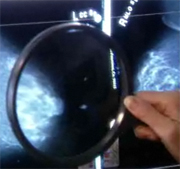
WEDNESDAY, March 13 (HealthDay News) — Radiation treatment for breast cancer, given after breast-conserving surgery and sometimes after mastectomy, is known to reduce the risk of the cancer returning and death from the disease. But the therapy comes with its own risk.
The treatment has been found to increase the odds of developing heart disease later, through incidental radiation exposure to the heart. In a new study, researchers evaluated the magnitude of that risk.
“For the vast majority of my patients, I can reassure them about the risk to the heart,” said Dr. Carolyn Taylor, a consultant clinical oncologist at the Clinical Trial Service Unit at the University of Oxford, in England.
“This is showing that, for the vast majority of women, the benefits of breast cancer radiation outweigh the risks [to the heart],” Taylor said.
The study is published in the March 14 issue of the New England Journal of Medicine.
The study did not, however, look at all types of heart problems linked with radiation therapy, nor did it consider chemotherapy, which also has been linked with heart problems later, said Dr. Javid Moslehi, who wrote an editorial accompanying the study.
Women should be aware of all these heart disease risks after radiation treatment to the breast, said Moslehi, director of the cardio-oncology program at Dana-Farber Cancer Institute and Brigham and Women’s Hospital in Boston.
For the study, Taylor’s team evaluated more than 2,100 women who had radiation therapy for breast cancer in Sweden and Denmark between 1958 and 2001.
They evaluated nearly 1,000 women with major heart events and more than 1,200 women who did not have heart events and served as the comparison group.
Major heart events analyzed included heart attack, the need to unblock or replace blocked blood vessels to the heart, or death from ischemic heart disease (in which there is a reduced blood supply to the heart).
The higher the radiation dose, the higher the risk of these heart problems. “This study has shown for the first time that as the radiation dose to the heart increases, so does the risk of radiation-induced heart disease,” Taylor said.
In recent years, Taylor said, improvements in radiation machines have made it possible to deliver radiation more accurately so the heart receives less exposure.
Taylor evaluated each woman’s average dose of radiation to the heart. The overall average was 4.9 units, or grays. Women with cancer in the left breast — which is closer to the heart — averaged more heart exposure (6.6 grays). Today, Taylor said, the average overall ranges from 2 grays to 10 grays.
The rate of heart problems increased by 7.4 percent per gray. No starting threshold was found.
The risk started within five years after treatment and persisted into the third decade.
The proportional increase was similar in women with and without heart disease risk factors (such as high blood pressures) at the start. Those with pre-existing risk factors, however, had greater absolute increases in risk.
To put the finding in perspective, for a 50-year-old woman with no pre-existing heart disease risk factors, a dose to the heart of 3 grays would increase the risk of death from ischemic heart disease before age 80 from 1.9 percent to 2.4 percent, Taylor said.
Doctors should identify women with pre-existing heart disease risk factors and those with a small distance between heart and breast and give the radiation in a way that minimizes heart exposure, Taylor said.
Editorial author Moslehi, who also is an instructor of medicine at Harvard Medical School, said the study results are important, but not entirely reassuring. “It suggests that women should worry about heart disease risk after radiation therapy,” he said. The new findings “may be just the tip of the iceberg,” he said.
Taylor’s team did not look at all types of heart problems, Moslehi said. Radiation therapy has been linked with other cardiac problems, including heart rhythm issues and valve problems.
In addition, he said, some chemotherapy has been linked with heart risks.
Until more research is in, Moslehi said women should be sure their primary-care doctor knows if they had radiation therapy for breast cancer. The doctor should also evaluate other cardiac risk factors, such as high blood pressure and cholesterol, he added.
Study author Taylor said cardiologists and oncologists have been communicating more in recent years.
Women should not only get help from their doctors to reduce their heart disease risk, she said, but pay attention to heart-healthy habits. They should eat a healthy diet, exercise regularly and not smoke cigarettes, she said.
More information
To learn more about radiation therapy for breast cancer, visit the American Cancer Society.

